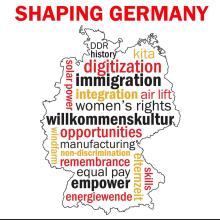The problem of waste is an often overlooked environmental problem. We often do not realize how much garbage we produce by, for example, buying coffee in non-reusable cups, using plastic straws, or carrying our groceries in plastic bags. After watching Fatih Akin’s documentary Polluting Paradise (2012) and Werner Herzog’s short independent movie “Plastic Bag,” students produced their own advocacy spots in which they informed about the problem of garbage and came up with everyday solutions on how to reduce the tremendous amount of waste we create.
Team 1: The group’s spot “Verschwendet” informs about the huge amounts of waste from plastic bottles. Often these bottles are not even recycled and end in landfills. One of the countries that seek to create incentives to recycle and reuse these plastic bottles is Germany with their “Pfandsystem”. Here, consumers pay a deposit on every plastic bottle they purchase which they will receive back in form of a voucher when they return their empty plastic bottles to the store.
Team 2: In their video “Bathroom Waste: It’s not Private Business Anymore” the team educates about the amount of waste we produce behind our bathroom doors: from wasting water to using too much toilet paper, soap, and even toothpaste. Being aware of these little things and reducing, for example, the amount of shower time can make a significant impact in reducing the amount of waste we produce and reduce our reliance on water and electricity.
Team 3: The group’s advocacy spot entitled “Strawless in Seattle” informs about the harmful impact of non-reusable straws in the environment. Due to their size, straws cannot easily be recycled and end up in landfills and in our oceans. Seattle is one of the first cities worldwide that banned non-compostable plastic straws from restaurants and cafes.
Team 4: Their video “Jeopardy: Environmental Edition” asks contestants questions about waste and recycling and refutes common beliefs and knowledge of how much waste we actually produce. They educate, for example, that we recycle a lot less waste than we tend to believe and that our individual action can make a difference in improving the problem.
Team 5: In their advocacy spot “The Final Straw” the group educates about the amount of waste the average individual produces within a week. The majority of this waste consists of plastic containers and bottles, non-reusable coffee cups as well as straws and can be easily avoided by using reusable products.
Team 6: Their video “Geese Police” informs about the harmful impact of our waste on animals. Unlike humans, these animals do not have a voice. However, the Rainier Vista on campus has the geese police that asks students to throw their trash such as plastic bottles and cigarette buds into garbage cans instead of leaving it in bushes and on walkways.
Team 7: The team’s spot “Trash Talk: Talking Dirty” contrasts waste-conscious and wasteful behavior showing how easy it is, for example, to bring a reusable bag to the grocery store.
Team 8: In their video “The Waste Whisperer” helps individuals to make the right decision and throw their garbage into the right waste bin. Often we do not know if the trash we produce is recycled, or food waste that is composted, or more garbage that ends up in landfills.
